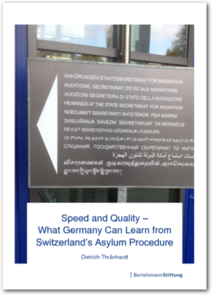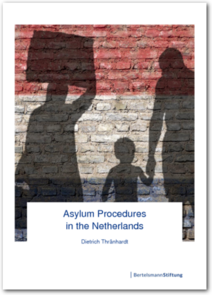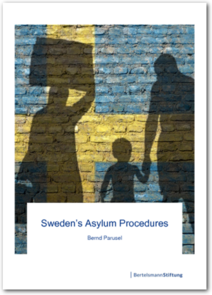The number of asylum seekers in Europe has increased continuously over the last years: Eurostat counted 182,000 first applications in 2008 in the EU including Switzerland and Norway, in the "crisis year 2015" these applications reached 1.3 million. Both the number of asylum seekers and the asylum procedures vary considerably among countries in Europe. Therefore, the European Commission aims at the harmonization of asylum policies in order to establish a common efficient and fair approach towards refugees.
Three studies commissioned by the Bertelsmann Stiftung analyse how Switzerland, the Netherlands and Sweden managed the refugee crisis in 2015. Switzerland had to deal with 38,000, the Netherlands with 43,000, Sweden with 156,000 first asylum applications.
These three countries are of particular interest for other countries in the EU struggling with high numbers of refugees: Switzerland has reformed its asylum system in 2015 inspired by the Dutch reform model combining the acceleration of asylum procedures with free legal counseling and Sweden has stood out in Europe due to its generous approach towards refugees.
Dietrich Thränhardt analyses the Swiss and the Dutch systems examining what a country like Germany can learn from these models. In the case of the Netherlands, however, the reform model has come under pressure so that the government announced a reorganization by the end of 2015: the legal support for asylum seekers seems to be questioned.
The Swedish system studied by Bernd Parusel has experienced a paradigm shift due to the high influx of asylum seekers: only the number of asylum applications by unaccompanied minors has risen from 7,000 in 2014 to 35,000 in 2015. Sweden has given up generous arrangements like unlimited permits for refugees granted asylum and changed the rules of family reunification. Yet, the free legal advice for asylum seekers with their first applications rejected has not been questioned so far.
Europe needs common standards for efficiency and fairness vis-à-vis refugees. However, given the rise of populist movements across Europe, the efforts of the European Commission may not be very successful to prevent a race to the bottom regarding asylum standards. Yet, there is no alternative to efficient and fair asylum systems in order to do justice to refugees, receiving countries in Europe and countries neighbours to conflicts which bear the main burden of the current refugee crisis.
![[Translate to English:] Fotolia_92300025_58163](/fileadmin/files/_processed_/a/9/csm_1081869035Fotolia_92300025_X_9efa2fed9f.jpg)


